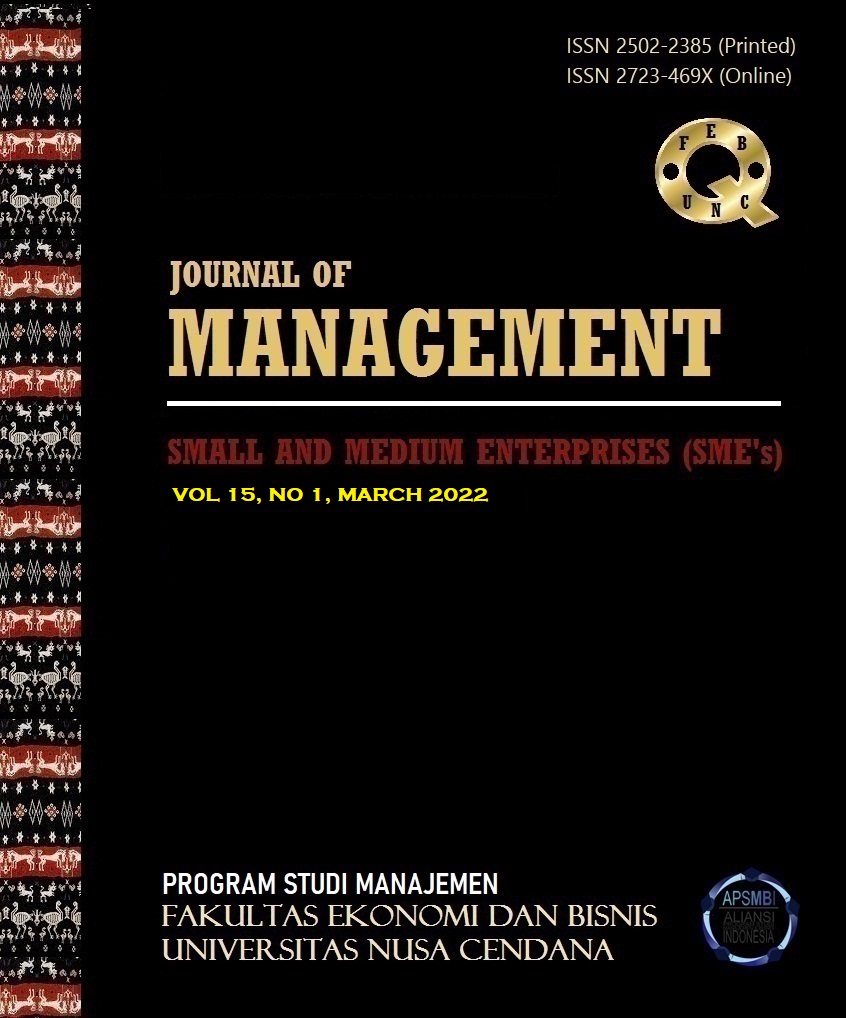FEMALE ENTREPRENEURS IN THE COVID 19 ERA: A RETURN TO TRADITIONAL ROLES
Abstract
During the last two years, the world has experienced an unprecedented health crisis, and in addition to health and social issues, the economy has been severely affected, with all its actors, particularly the VSEs-SMEs created and managed by women. The main objective of this study was to assess the degree of impact of family responsibilities of Moroccan women entrepreneurs on their efficiency in managing their businesses in difficult times following the Covid 19 pandemic. To do this, we used a qualitative approach and interviewed a sample of thirty women entrepreneurs running VSEs-SMEs. Interviews with these women show that because of this crisis, women have finally chosen and sometimes even been forced to return to their traditional roles of taking care of the home and children especially during the period of lockdown, which has lowered their performance and efficiency in saving their businesses from this crisis. Our results can provide empirical support for support structures to adapt their programmes to the real needs of Moroccan women entrepreneurs, including personalised support, more than technical and financial assistance.
Keywords: Female Entrepreneurship; Covid 19; Family Responsibilities; VSEs SMEs.
Downloads
References
Andersson, I, Raihan, A, Rivera, M, Sulaiman, I, and Tandon, N. (2007). In Welter, F. (Ed.), Handbook “Women-Owned SMEs: Challenges and Opportunities in Policies and Programmes”, International Organisation for Knowledge Economy and Enterprise Development (IKED) and Global Knowledge Partners (GKP).
Banque Mondiale. (2009). Doing business 2009. Washington D.C., The International Bank for Reconstruction and Development/The World Bank.
Brière, S., Auclair, I., Larivière, V., and Tremblay, M. (2014). “Emerging contextual strategies to support women entrepreneurs in Africa: looking beyond traditional and individual approaches”. Paper presented at the 8th Biennial international interdisciplinary gender work and organization conference. Keele University, United Kingdom.
Brush, C.G., De Bruin, A., and Welter, F. (2009). “A gender-aware framework for women’s entrepreneurship”, International Journal of Gender and Entrepreneurship, Vol. 1 No. 1, pp. 8-24.
doi: //doi.org/10.1108/17566260910942318
Carter, S., Arter, S., Anderson, S., and Shaw, E. (2001). “Women’s business ownership: a review of the academic, popular and internet literature”, Small Business Service Research Report, Department of Trade and Industry, London.
Cornet, A., and Constantinidis, C. (2004). “Entreprendre au féminin : une réalité multiple et des attentes différenciées”. Revue française de gestion, 4(151), 191-204.
doi : 10.3166/rfg.151.191-204
Devita, L., Mari, M., and Poggesi, S. (2014). “Women entrepreneurs in and from developing countries : evidences from the literature”. European Management Journal, 32(3), 451-460.
doi: https://doi.org/10.1016/j.emj.2013.07.009
Gasse, Y. (2003). “L’influence du milieu dans la création d’entreprise”. Revue organisations et Territoires, 12(2), 49-56.
doi: https://doi.org/10.1522/revueot.v12n2.741
Global Entrepreneurship Monitor (GEM). (2010). Rapport régional GEM-MOAN (Moyen-Orient et Afrique du Nord). Caire, Égypte, International Development Research Centre.
Guyot, J.L., and Lohest, O. (2007). “Barrières à l’entrepreneuriat et primo-création d’entreprise : le genre est-il une variable discriminante ?” Belgrade, Belgium, Institut wallon de l’évaluation, de la prospective et de la statistique.
International Labour Office (ILO). (2019). “l’évaluation du développement de l’entrepreneuriat féminin au Maroc” in collaboration with Ministry of Employment and Social Affairs and with the financial support of Global Affairs Canada.
Krippendorff, K. (2003). “Content analysis: an introduction to its methodology”, 2nd Edition, Sage Publications, Thousand Oaks, CA.
Lee Gosselin, H., Housieaux C., and Villeneuve, M. (2010). “Réalités, besoins et défis des femmes entrepreneures de la Région de la Capitale-Nationale”. Étude sur l’entrepreneuriat féminin.
URL:https://numerique.banq.qc.ca/patrimoine/details/52327/2163501?docref=YynPAUEeZLatdH72H1KZgw
Leger Jarniou, C. (2013). “Femmes entrepreneurs et forte croissance : est-ce possible ?”, 8e Congrès de l’Académie de l’entrepreneuriat et de l’innovation. Fribourg, Suisse.
Mclaurin, J.R., and KUCHTA, A. (2008). “A comparison of women entrepreneurs from Poland, the United Arab Emirates and the United States”, Proceedings of the Allied Academies, Vol. 15, pp. 179-184.
Miles M.B., and Huberman A.M. (1991). “Analysis of qualitative data”, Collection of new methods, by Boeck University, Brussels.
Manolovo, T.S., Brush, C.G., Edelman, L.F., and Elam, A. (2020). “Pivoting to stay the course: how women entrepreneurs take advantage of opportunities created by the Covid-19 pandemic”. International Small Business Journal, 38(6), 481-491.
Doi: https://doi.org/10.1177/0266242620949136
Robinson, S. (2001). “An examination of entrepreneurial motives and their influence on the way rural women small business owners manage their employees”, Journal of Developmental Entrepreneurship, Vol. 6 No. 2, pp. 151-167.
Rachdi, F. (2006).” L’entreprenariat féminin au Maroc: une étude exploratoire”. 8th International Francophone Congress on Entrepreneurship and SMEs: Internationalisation of SMEs and its consequences on entrepreneurial strategies. Fribourg, Switzerland, 25-27 October.
Saleh, L. (2011). “L’intention entrepreneuriale des étudiantes: cas du Liban”. Nancy, Université Nancy 2, Institut d’administration des entreprises.
Tahir Metaiche, F. (2013). “Les femmes entrepreneures en Algérie: savoir, vouloir et pouvoir!”, Marché et Organisations, 2(26), 219-240.

 Nadia Laaraj(1*)
Nadia Laaraj(1*)



